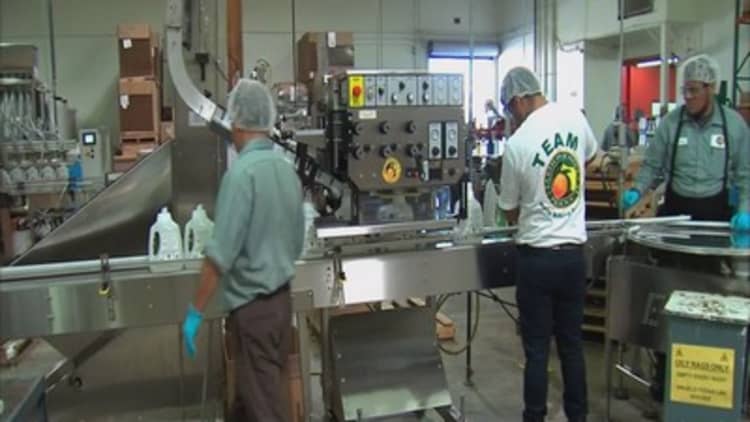
The fight to raise the minimum wage has been gaining traction, with cities including Los Angeles and Seattle independently raising pay above the federal minimum. As of now, 29 states and Washington, D.C. have wages above the federal floor of $7.25 an hour that hasn't been raised in six years.
Now with the rhetoric surrounding the 2016 president race likely to intensify in the coming months, a key question is how traditional red states will address the wage fight. By many measures, a higher federal rate won't be an easy climb. And some entrepreneurs already have independently lifted pay above the national minimum.
Perhaps a sign of what's to come, four red states—Alaska, Arkansas, Nebraska and South Dakota—last year increased wages in mid-term ballot measures. This as congressional Democrats have pushed to raise the federal minimum to $12 an hour by 2020. Other wage advocates are pushing for $15 an hour, especially in the fast-food sector.
Red state wage hikes
Republican Gov. Asa Hutchinson of Arkansas said the state periodically reviews and increases wages. The Arkansas state minimum pay is $7.50 an hour, and will reach $8 an hour on Jan. 1, 2016. However, the governor is not in favor of the congressional Democrats' plan for $12 an hour by 2020 at the federal level.
"The market is responding with [wage] rates above state and federal minimum wages," Hutchinson told CNBC. He's concerned raising wages too fast too much could dampen economic growth.
Read More
Wage advocates argue the pace of wage growth isn't happening quickly enough.
"While it's important that numerous states and cities have enacted increases, we need to raise the federal minimum wage so that all Americans can benefit from an adequate wage floor," said Holly Sklar, chief executive of wage advocacy group, Business for a Fair Minimum Wage.
Some businesses moving forward
And despite concerns that higher wages cut business growth, some entrepreneurs independently are moving to raise wages—and grow operations. Some small business owners are moving forward wages, and not waiting for changes at the federal level.
Earth Friendly Products is an environmentally friendly cleaning products manufacturer. The Addison, Illinois-based company has operations in five states. The company's 321 full-time employees have always earned more than the federal minimum wage, said chief executive Kelly Vlahakis-Hanks.
Last year, Vlahakis-Hanks raised her workers' pay to $17 an hour. And the manufacturer hasn't raised prices, or taken a profit hit. And the company's voluntary employee turnover rate? Zero.
"When you compensate your employees fairly for their work, they enjoy coming to work. They're proud of coming to work," Vlahakis-Hanks said. "It's the right thing to do for our economy because we need to have employees that can purchase our product."
On the East Coast, at Bar Marco in Pittsburgh, Pennsylvania, co-owner Justin Steel has implemented a tip-free flat wage for all employees—from waiters to kitchen staff—at $35,000 a year. Employees also get a stake in the restaurant through a profit-sharing program, plus health-care coverage.
Bar Marco hasn't raised prices, and is on track to hand out its first-ever quarterly bonuses to workers—practically unheard of in the food service industry. And the company is retaining more workers, a big plus in the food-service business.
"A lot of times, restaurant employees view this as a job, not a profession or career," Steelhas said. "But the people we have here don't think of it like that… We wanted to give them more of the things you would normally associate with a 'real world job.'"


